Rum makers looking to profit from industry waste
Rum makers in Jamaica are looking to boost efficiency in their business by paying more attention to better environmental practices and supporting sustainable social habits, even as they keep a sharp eye on taxation policies that could derail the viability of their industry.
For starters, the makers and purveyors of Jamaican spirits want to cash in more significantly on the by-product of the distillation process – yeast-rich dunder – which is now being used as fertiliser for cane fields by some distilleries.
Dunder, also known in the rum-making world as stillage, is also used by some rum producers to make what are described as more funky, high ester rums with greater aromas.
A policy for the commercialisation of dunder is among the plans under consideration by new chairman of the Spirits Pool Association, Clement ‘Jimmy’ Lawrence.
“We want to ensure that our activities and efforts are in no way deleterious to the environment,” Lawrence told the Financial Gleaner. He pointed out that the rum-making waste is not “in and of itself toxic to the environment” despite its strong, pungent smell.
Rum companies in Jamaica are required to discharge dunder under controlled conditions that are set out in their licences. Dunder in high concentrations can be deadly to marine life.
About four years ago, an accidental discharge of unprocessed dunder from Appleton Estate in St Elizabeth into the North Elim River was blamed on a malfunctioning pump. The spill was quickly corrected by Appleton amid a warning from environmental regulation and protection agency NEPA.
“It is benign but well-regulated. We want to continue to improve that and to increase its beneficial contribution within the framework of the economy,” Lawrence noted. He pointed out that in additional to being used as fertilizer for sugar cane and other crops, dunder can be incorporated into the production of animal feed in order to capitalise on its high nutrition potential.
“This is something that we will have to progressively explore. We need a framework within the whole control mechanism and regulatory environment to enable it to be more easily done, but under the appropriate controls,” the Spirits Pool chairman said of the possible commercial uses of the rum by-product.
Under Lawrence’s chairmanship of the umbrella group of Jamaican rum distilleries, the body is expected to continue its robust engagement in advocacy issues at the national and Caribbean levels on its own and in collaboration with the Jamaica Rum and Spirits Traders Association, or JRASTA, and the West Indies Rum and Spirits Producers Association, WIRSPA.
This includes leadership in the promotion of responsible drinking that will see new labelling to give calories-per-serving information, a campaign against under-age drinking and alcohol consumption during pregnancy, and other harmful uses of alcohol in an effort to reduce the prevalence of non-communicable diseases.
Advocacy in the area of spirits taxation is also on the radar for the new chairman, who is of the view that in recent times, there has been a more level playing field in Jamaica in this regard. The group will be keeping its eye on the ball in relation to the application of general consumption tax, special consumption tax, and duties on molasses importation.
Lawrence insists that unfair taxation of his industry limits its potential for growth, and it is his view that further growth in the Jamaican rum industry is required at this time.
Meanwhile, general manager of the Spirits Pool Association, Christopher Gentles, says that the Ministry of Finance is updating the legislation related to the rum industry, including the Excise Duty Act. This update, he maintains, is important for encouraging future investments in the industry so as to increase the industry’s contribution to the national economy.
As it stands, chairman Lawrence added, the act does not ensure maximum ease of doing business, and in the Government’s move to have Jamaica move up in the ease of doing business ranking, the review of the Excise Act and other relevant legislations will create a fillip for national development.

